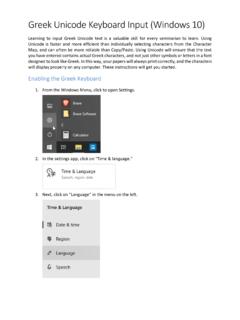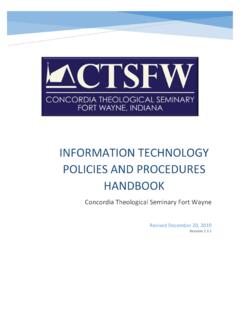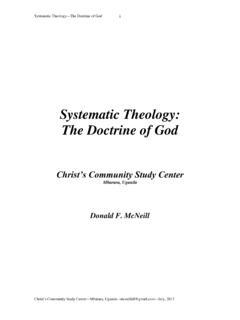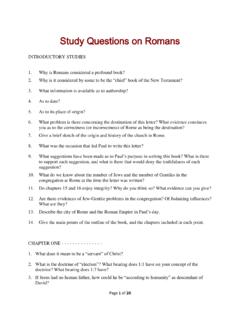Transcription of Devotions for Lent 2022
1 Devotions for Lent 2022 prepared by students of Concordia Theological Seminary Fort Wayne, Indiana and Concordia Seminary, St. Louis, Missouri Repent, for the Kingdom of Heaven Is at hand. Preface Silas Hasselbrook, Spiritual Life Chair, CTSFW How to Use This Booklet Each of the Devotions in this booklet are written on a portion of each of the 7 penitential Psalms (with the exception of Psalms 22, 16, and 139 which are the basis for the Devotions on Good Friday, Holy Saturday, and Easter Sunday). It is hoped that these Devotions can serve as a brief but daily template for individuals, families, and groups of CTSFW and CSL throughout the Lenten journey.
2 In order to obtain the most benefit from these Devotions , one may keep these things in mind: 1] For each devotion, sing through the Psalm (using a Psalm tone) in its entirety before meditating on the specific verses for the day; 2] Try to keep in mind the surrounding context of the specific verses; 3] Go through each devotion, as able, with your entire family or a group of friends; 4] Set aside time each day to make this a daily practice; 5] These are templates. The one leading the devotion may offer further remarks or add other elements. This booklet s content are Psalms.
3 And the Psalter is the prayer-book of the Church. Prayer is not simply relegated to closing one s eyes, speaking a few sentences, and stamping it with Jesus name on the end. Prayer is a deliberate meditation on God s Word. One might consider Luther s counsel. In A Simple Way to Pray, Luther writes about how he prays the 10 Commandments, which is equally applicable to praying the Psalms. First, he reflects on how the Word instructs him: what God would have him do or not do, and how it teaches him about God. Second, he thanks God for the truths shown within the text. Third, he confesses with the language of the text how he has not obeyed and loved God.
4 Last, he prays that God would forgive, help, and preserve him (LW 43, p. 200). When the disciples ask Jesus how to pray, He might have directed them to the Psalter. In a way He did. The Lord s Prayer contains all the Psalms. This is why Luther, in The Summaries of the Psalms, 1531, seeks to see which petition(s) of the Lord s Prayer each Psalm is addressing. But Jesus, in giving the Lord s prayer, showed us that we pray to God, who is His Father and ours. The prayer that Jesus has taught us is one in which we address our Father, through the Spirit, in the Son. So, too, with the Psalms.
5 Prayer extends far beyond the moment one speaks the words of such. Prayer is a way of life, rooted in self-reflective application of God s Word. And, most fundamentally, prayer is entering the Triune dialogue in the Son s name, as sons of God. Seen this way, it is Christ who first prays these Psalms to the Father, and we in Him. These Psalms speak of Christ first, but us too, for we are in Him. The theme for this booklet is the first words of John s and Jesus ministry: Repent, for the kingdom of heaven is at hand! This is especially good to remember during Lent, as we pray the penitential Psalms.
6 Therein, repentance, namely, sorrow and brokenness over sin, is described in palpable, poignant, and passionate language. Make it your own. For though the tears for sin must flow (LSB 417), the Psalms also supply you with rich language to glory in the lavish grace and mercy of God, both here in time and hereafter in eternity. We do not repent in order to stay in a state of despair. We repent, because the kingdom of heaven is at hand, because forgiveness and salvation are at hand, because the crucified and risen Christ is at hand. And because Christ is at hand, we repent. We mortify our sinful flesh by receiving Christ in Word and Sacrament.
7 And we repent continually in this life, putting to death the desires of the flesh, and receiving consolation in Christ. The kingdom of God is at hand. Christ will usher us into the inheritance of His kingdom. May we be kept ever faithful until His final coming! Introduction Ian Heinze, Spiritual Life Chairman, CSL It starts on Septuagesima (third Sunday before Ash Wednesday): no more joyful Alleluias. It deepens on Ash Wednesday: no more Gloria in Excelsis. It deepens further still on Judica (fifth Sunday in Lent): no more Gloria Patri. The silence of the praise grows deeper and more profound in stages throughout the days of Pre-Lent, Lent, and Passiontide, until we are reduced to silence before the marvel of the Cross on Palm Sunday and throughout Holy Week.
8 Finally, having stood before the Supreme Sacrifice in silence on Good Friday, our praises burst forth with greater joy than can be imagined in uncounted Alleluias! Glorias ring out at the great Paschal Feast! Lamb of God, pure and holy, Who on the cross didst suffer, Ever patient and lowly, Thyself to scorn didst offer. All sins Thou borest for us, Else had despair reigned o'er us; Have mercy on us, O Jesus! O Jesus! Thy peace be with us, O Jesus! O Jesus! As we make our pilgrimage through the season of Lent this year, seminarians from CTSFW and CSL have focused on the Penitential Psalms for our Devotions .
9 The seven penitential Psalms (6, 32, 38, 51, 102, 130, 143) teach us the biblical doctrine of repentance, sorrow over our sin, and the sure and certain hope of the forgiveness in Christ. God does His alien work through the Penitential Psalms. He reveals our sin, as well as His wrath and anger. He crushes and destroys. He rips and shreds. He breaks hard hearts of stone. Yet our loving and merciful God also delivers His proper work through the Penitential Psalms. He forgives and restores. He unites us to Himself. He mends the broken and raises up the lowly. As blessed Martin Luther proclaimed, It is the nature of God that He creates of out nothing; therefore, God cannot make anything out of him who has not yet become nothing.
10 (On the Seven Penitential Psalms). Lent reminds us that we have an enemy who is intent on devouring us. Lent reminds us that we have a Savior who became dust and ashes for us, to make our dust immortal. Lent reminds us that at the end of the journey, at the end of return, there awaits the God who has mercy on and abhors nothing He has made and who looks past the sins of men that they may repent (Ash Wednesday Introit). Memento! You are dust and to dust you shall return. Memento! Dust you shall eat. Memento! He took upon Himself not the nature of angels, but the Seed of Abraham.






